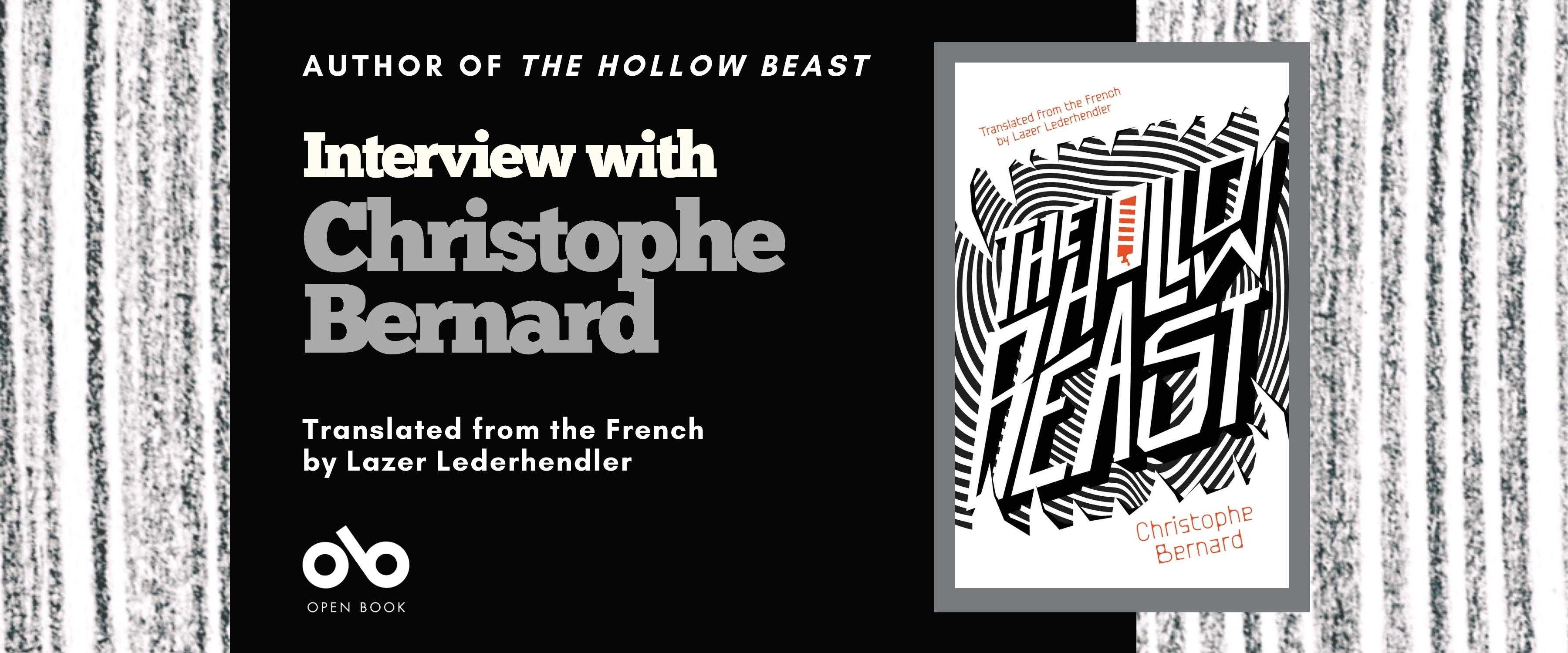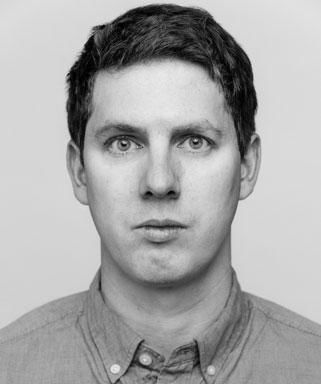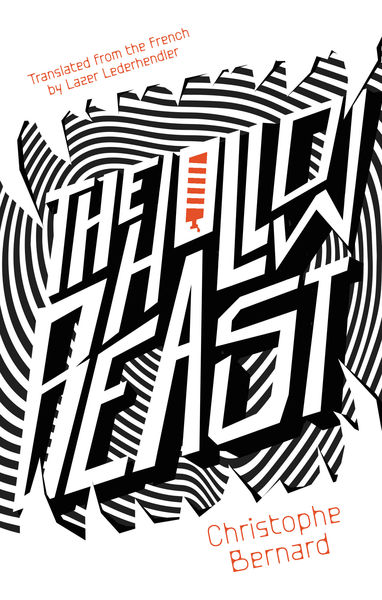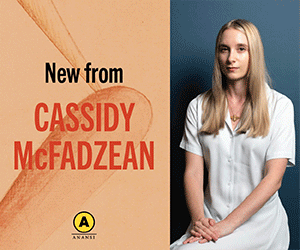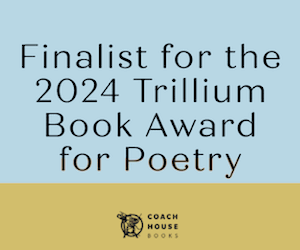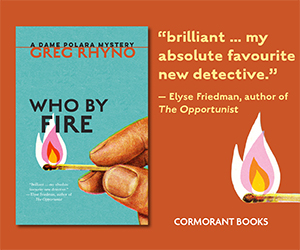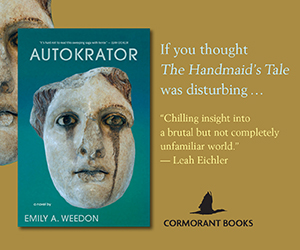Blood-Feuds and Beastly Hallucinations Lurk in the Pages of The Hollow Beast by Christophe Bernard
Already an award-winning author in Quebec, Christophe Bernard has now found his way into English translation, and his work aims to leave a mark on the broader landscape of CanLit. The author travelled far and wide before diving into novel writing, and absorbed important lessons from modern literary greats, channelling his experiences and influences into a singular voice.
In The Hollow Beast (Biblioasis), a hockey game in the Gaspé Peninsula, just after the turn of the 20th century, ends in a spray of shattered teeth and a blood-feud born on that very ice that will build over a century. With high-proof hooch in their veins, the wounded Monti and his descendants, including his grandson François, take this generational vendetta to its conclusion while haunted by hallucinations of a technicolour beast that follows their kin.
We're thrilled to have the author of this dark, epic comedy on Open Book, and to hear more about this exciting new novel in this Long Story novelist interview:
Open Book:
Do you remember how you first started this novel or the very first bit of writing you did for it?
Christophe Bernard:
I do. The project came to me in Berlin, as I was lying for a couple of weeks in a hospital bed with an enlarged liver. I had plenty of time to think, and the fact that I had just spent several months in Germany had given me a different perspective on Quebec’s particular culture and place in the world. When I returned home a few months later, I started a series of narrative poems – those are now lost, thank God. But those poems contained the first writing impulses, the first stylistic experiments, the first imaginary figures that would give shape to the novel. I quickly switched to prose, as I was in the process of moving to the USA and had become obsessed with American fiction, which was mostly new to me. It was as if I had discovered a new planet—I was absorbing American writers almost in a panic. I must have scribbled on more than five hundred notebook pages before finally getting to what would become the first page of the book, to a point where I was like, ok, I can start now. I had just finished reading Infinite Jest, and I was still shaking from that experience when I grabbed my laptop and wrote a wild scene, a phantasmagoric poker game that takes place in a remote encampment.
OB:
How did you choose the setting of your novel? What connection, if any, did you have to the setting when you began writing?
CB:
Well, the setting is basically my book’s DNA. The story, the speculative elements, pretty much every character except Monti, all that came after I had developed a sense of the setting that was rich enough to drive a writing project that would take several years. The book is about the Gaspé Peninsula: its mythology, its strange, wonderful humor, and its wildly inventive language. The place and the people there are what made the adventure of this book possible. I was born there, in the village of Maria. I didn’t really grow up there, but my family on my father’s side is still there, and because I have been going back to see my extended family for my entire life, it definitely shaped me.
OB:
Did you find yourself having a "favourite" amongst your characters? If so, who was it and why?
CB:
It’s funny, because the novel has two timelines, the story constantly alternates from one to another. They each come with their own vibe, their own weirdness and, let’s say it like this, their own plasticity, and even if the novel functions as a whole, we have two stories in there, two very different experiences. I read the book about 10 000 times, and at different times I found myself more attached to one or the other storyline, thinking that one or the other was the core of what I was trying to achieve. Now that some years have passed, I can say that for me Monti still stands the test of time. I am satisfied with his arc and his quirks, I think he is textured nicely enough, and embodies one of the objectives I had given myself: to write about traditional things with the lens of someone who grew up in the 90s, watching The Simpsons and drinking those little plastic-foil bags of juice you poked a straw into. He is also very loosely based on my actual ancestor, there is a fair amount of mythology about him where I am from and his life provided me with all the initial elements that I needed to build my story. So I am immensely grateful to him for that.
Your CanLit News
Subscribe to Open Book’s newsletter to get local book events, literary content, writing tips, and more in your inbox
OB:
What was the strangest or most memorable moment or experience during the writing process for you?
CB:
Probably the appearance, in my story, of the beast itself. The beast wasn’t a part of the original concept, and I was actually somehow advanced in the process when the idea came to me. My family and I were living in a bizarre little house back then, an old general store where every plumber or carpenter or electrician who ever came just said ‘What the heck is that?’ the second they opened whatever panel they had to open. My first kid was still a baby, so I was often writing fairly late at night, when things would settle down, in that makeshift office I had put together in a creaky room full of impractical angles. In the book, the beast appears to Monti after him and his partners play a round of poker that defies all the odds; he follows it from then on, and the beast becomes a symbol of many things, among them destiny. That said, it was quite an epiphany when I imagined it, because it instantly crystallized the meaning and the haunted feeling that I was trying to inject into my story. Soon the beast became the thing I had to follow for every piece of the story to fall into place. I consider myself lucky that this creature crossed my mind on one of those random writing nights, because I could have sat up nights for a very long time trying to come up with an extended metaphor that could organically span a 600-pages novel, and might very well have ended up with not much more than a bruise on the brain.
OB:
Who did you dedicate your novel to, and why?
CB:
The book is dedicated to my friends, and I want to believe that those friends who read the book didn’t need to be named explicitly to know that it was about them. I also hope that they all read the book… Like most writers, throughout the process I’m writing for an ideal reader, or at least a first reader. Of course, my publisher played a big role there, but in the end, I was writing for the friends I grew up with. We developed our imagination and our sense of humor together, less so now, but when we were younger our literary and artistic frenzies felt like a collective affair, and there are several anecdotes and winks throughout the book, stuff that pertains to our shared mythology, because we sure have a strong tendency to mythologize in the Gaspésie. There are even bits of language, obscure expressions that I have no clue how my translator so courageously tackled, because they are homemade, only known to a handful of kids, they are phrases we had come up with that seemed to me worth recording. A lot of things like this became part of my material, and so, in a way, the book is a testimony to our collective experience. I am not even sure if those friends liked the book that much but it doesn’t matter: the book still became ‘a thing’ among us, and I think otherwise I would have experienced it as a failure.
OB:
What if, anything, did you learn from writing this novel?
CB:
I learned a lot of lessons in the 10 years I spent writing The Hollow Beast. As a writer, I feel like the kid who picks up a rock to throw at a building, it’s better to aim for the roof, even if your arm is not quite strong enough, you’ll end up breaking a second-floor window but that’s ok, there is a beauty in that. Don’t start with too much ambition, but let the ambition swell if it does so naturally during the process. Don’t start with too many ideas, because ideas breed like bunnies. Writing is the flip side of reading, and to me the goal was to write the book I couldn’t find elsewhere, and that I was itching to read, just like when you have a craving but can’t quite put your finger on it. So read. Read things that blow your mind. Cheap metaphor here, but writing is also like building a house; don’t rush it, make it a home, take pleasure in the familiarity of returning to it day after day, year after year. There is something charming and comforting in that musty smell and those little language trinkets that you scattered here and there and that have been gathering dust ever since. Writing is also charting unknown territory. So dig. Get lost. Don’t try to control everything. Embrace the failures. Keep at it. Because writing is more than anything rewriting, and yes, it’s alarmingly tedious and empty at times, but when you reach a point where you read yourself over and think with amazement, man, I had no idea I had that in me, well, that is a rare and elevated pleasure.
_________________________________________________
Originally from Carleton-sur-Mer in the Gaspé region of Quebec, Christophe Bernard studied literature in Quebec City, Aix-en-Provence and Berlin. A prolific literary translator, Bernard was a finalist for the 2016 Governor General’s Literary Award for English-to-French Translation. The Hollow Beast, a finalist for the 2018 Governor General’s Literary Award for Fiction in French, won the Quebec-Ontario Prize, the Quebec Booksellers’ Prize and the Jovette-Bernier Prize. Christophe Bernard lives in Burlington, Vermont.
Lazer Lederhendler is a full-time literary translator specializing in Québécois fiction and non-fiction. His translations have earned awards and distinctions in Canada, the UK, and the US. He has translated the works of noted authors, including Gaétan Soucy, Nicolas Dickner, Edem Awumey, Perrine Leblanc, and Catherine Leroux. He lives in Montreal with the visual artist Pierrette Bouchard.
